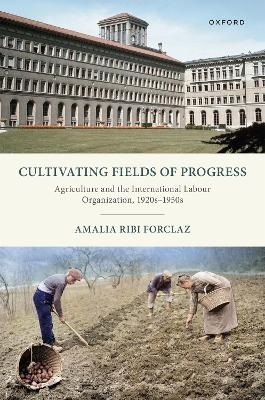
Cultivating Fields of Progress
Agriculture and the International Labour Organization, 1920s–1950s
Seiten
2025
Oxford University Press (Verlag)
978-0-19-284989-2 (ISBN)
Oxford University Press (Verlag)
978-0-19-284989-2 (ISBN)
- Noch nicht erschienen (ca. März 2025)
- Versandkostenfrei
- Auch auf Rechnung
- Artikel merken
After the First World War, the improvement of working and living conditions in agriculture became an international issue for the first time. Led by the International Labour Organization and related organizations, the immediate interwar and post-war years were a fertile time for international debates, knowledge production, and policy-making.
After the First World War, the improvement of working and living conditions in agriculture became an international issue for the first time. Led by the International Labour Organization and related organizations, as well as overlapping expert networks, agrarian interest groups, trade unionists, and farmer representatives, the immediate interwar and post-war years were a fertile time for international debates, knowledge production, and policy-making.
Cultivating Fields of Progress traces the thematic, temporal, and geographical scope of these debates for the first time, from the plight of landless farmworkers in Europe in the early 1920s to the conditions of plantation workers in the 1950s. By using the archives of international organizations, the book considers how and to what ends questions of rural poverty and problematic labour conditions both in Europe and overseas made their way to the world stage, against a backdrop of broader discourses on social progress, decolonizaton, and economic development. Bringing the tools of social history to the study of economic and political history allows for a better understanding of the international development and circulation of ideas and theories of agriculture, as well as broader insights into the nature of power, policy, and knowledge production across a period of global change.
After the First World War, the improvement of working and living conditions in agriculture became an international issue for the first time. Led by the International Labour Organization and related organizations, as well as overlapping expert networks, agrarian interest groups, trade unionists, and farmer representatives, the immediate interwar and post-war years were a fertile time for international debates, knowledge production, and policy-making.
Cultivating Fields of Progress traces the thematic, temporal, and geographical scope of these debates for the first time, from the plight of landless farmworkers in Europe in the early 1920s to the conditions of plantation workers in the 1950s. By using the archives of international organizations, the book considers how and to what ends questions of rural poverty and problematic labour conditions both in Europe and overseas made their way to the world stage, against a backdrop of broader discourses on social progress, decolonizaton, and economic development. Bringing the tools of social history to the study of economic and political history allows for a better understanding of the international development and circulation of ideas and theories of agriculture, as well as broader insights into the nature of power, policy, and knowledge production across a period of global change.
Amalia Ribi Forclaz is Associate Professor in International History and Politics at the Graduate Institute Geneva. She studied at the University of Bern, the School of Oriental and African Studies in London, and she holds a DPhil in Modern history from Lincoln College, Oxford. Her research interests focus on the history of internationalism, the global history of slavery and abolition, and of agriculture and rural development. Her previous work include the monograph Humanitarian Imperialism. The Politics of Anti-Slavery Activism, 1880–1940 (Oxford University Press: 2015) and the co-edited volume Governing the Rural in Interwar Europe (2017).
| Erscheint lt. Verlag | 6.3.2025 |
|---|---|
| Verlagsort | Oxford |
| Sprache | englisch |
| Maße | 156 x 234 mm |
| Themenwelt | Geschichte ► Allgemeine Geschichte ► Zeitgeschichte |
| Sozialwissenschaften ► Soziologie | |
| ISBN-10 | 0-19-284989-1 / 0192849891 |
| ISBN-13 | 978-0-19-284989-2 / 9780192849892 |
| Zustand | Neuware |
| Haben Sie eine Frage zum Produkt? |
Mehr entdecken
aus dem Bereich
aus dem Bereich
Gewalt, Umwelt, Identität, Methode
Buch | Softcover (2024)
Spector Books OHG (Verlag)
CHF 49,95
wie Freud im Kollektiv verschwand
Buch | Hardcover (2024)
Klett-Cotta (Verlag)
CHF 34,95


